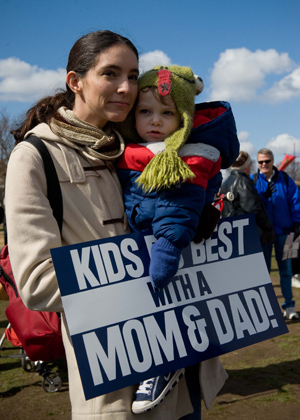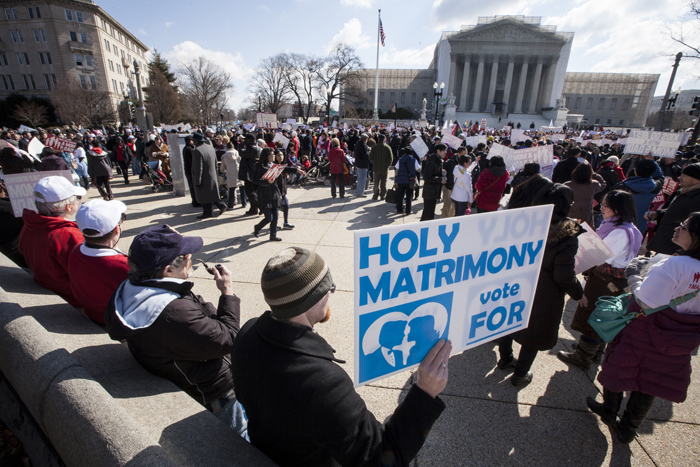
Ashley Carr from Reston, Va., and her son Joseph, attend the March for Marriage rally in Washington March 26. Thousands of people who gathered in support of traditional marriage took their message to the U.S. Supreme Court as they walked and held aloft placards objecting to same-sex marriage. (CNS photo/Matthew Barrick)
WASHINGTON (CNS) — Thousands of people, including hundreds from the Philadelphia Archdiocese, who gathered at one end of the National Mall March 26 in support of traditional marriage took their message to the U.S. Supreme Court as they walked and held aloft placards with signs saying: “Kids do best with a mom and dad.”
The court began hearing oral arguments that morning on the constitutionality of California’s Proposition 8, the law banning same-sex marriage, the day before hearing oral arguments in a challenge to the federal Defense of Marriage Act.
Hours before and up to the minute the hearings began, the street in front of the court was filled with protesters on both sides of the same-sex marriage issue. Those in support of traditional marriage came to Washington with church or parish groups from nearby or had traveled alone or with one or two others from states across the country, including Massachusetts, New York, Minnesota, Florida and Pennsylvania, including more than 200 from the Archdiocese of Philadelphia.
When the groups dispersed, those supporting traditional marriage continued their march back to the rally point on the mall where numerous speakers echoed the message that marriage should not be redefined.
Under sunny blue skies but chilly temperatures, those taking part in the March for Marriage cheered and applauded speakers who addressed the crowd from a platform under the banner: “Every Child Deserves a Mom and Dad.” The crowd, primarily adults, stood on muddy grass on the mall between the U.S. Capitol and the Washington Monument. Tour groups, including some on Segways, passed the group, and asked those on the periphery what the rally was about. A member of one family visiting Washington found out what was going on by looking it up on her smartphone.
Archbishop Salvatore J. Cordileone of San Francisco, chairman of the U.S. bishops’ Subcommittee for the Promotion and Defense of Marriage and the event’s first speaker, noted that all eyes were upon the country at this time.
“I want begin with a word to those who disagree with us on this issue and may be watching us right now: We love you, we are your neighbors, and we want to be your friends, and we want you to be happy.”
He continued: “Please understand that we don’t hate you, and that we are not motivated by animus or bigotry; it is not our intention to offend anyone, and if we have, I apologize; please try to listen to us fairly, and calmly, and try to understand us and our position, as we will try to do the same for you.”
He said the message of the day boils down to the concept that traditional marriage “matters to kids.”
“Only men can be fathers and only women can be mothers,” he added, noting: “I find it hard to believe I have to stand here and say that.”
He urged the Supreme Court justices for the “sake of the children” to “preserve the meaning of marriage in the law, a meaning common to every human society since the beginning of the human race.”
Other speakers similarly stressed the importance of preserving marriage as a union of one man and one woman.
Gia Coluccio, a recent graduate from George Washington University in Washington, stressed that contrary to what is often portrayed in the media, not all young people are in favor of same-sex marriage.
She stressed that young people need to realize that they can either “defend marriage or watch it be redefined.”
“It’s OK to be countercultural,” she added.
Other speakers noted that this was an issue they intended to keep defending, no matter how the Supreme Court ruled.
As one speaker put it: “We are here to be the conscience of America.”
Archbishop Vincenzo Paglia, president of the Pontifical Council for the Family, sent a message praising Catholics’ support for and participation in the march as a “witness to the beauty and value of Catholic belief and practice, which sees in marriage and the family a unique resource for the good of all humanity.”
The archbishop also said the ecumenical character of the march was important because it demonstrated the importance many Americans see in the marriage, particularly on the day when the U.S. Supreme Court will begin hearing arguments in two cases involving the definition of marriage.
“I think it is important as well that the march is being held during Holy Week, because that time in the life of the church not only makes us more aware of the great sacrifice that Jesus made in giving his life for us, it also reveals how he did so in the context of relationship that are mirrored in the life of every family,” the archbishop wrote.
Archbishop Paglia’s letter was addressed to Archbishop Cordileone and to Bishop Kevin C. Rhoades of Fort Wayne-South Bend, Ind., chairman of the U.S. bishops’ Committee on Laity, Marriage, Family Life and Youth.
***
Contributing to this story was Cindy Wooden in Rome.
PREVIOUS: Three new laws affirm North Dakota’s commitment to life, says bishop
NEXT: High court: Definition of marriage less a focus than who’s defining it



Share this story